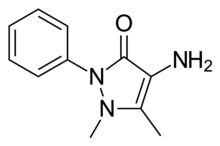Ampyrone
Appearance
(Redirected from Aminoantipyrine)

| |
| Names | |
|---|---|
| Preferred IUPAC name
4-Amino-1,5-dimethyl-2-phenyl-3H-pyrazol-3-one[1] | |
| Other names
solvapyrin A, aminoazophene, aminoantipyrene, aminoantipyrine, metapyrazone
| |
| Identifiers | |
3D model (JSmol)
|
|
| ChEBI | |
| ChEMBL | |
| ChemSpider | |
| ECHA InfoCard | 100.001.321 |
PubChem CID
|
|
| UNII | |
CompTox Dashboard (EPA)
|
|
| |
| |
| Properties | |
| C11H13N3O1[2] | |
| Molar mass | 203.24 g/mol |
| Density | 1.207g/cm3 |
| Melting point | 106 to 110 °C (223 to 230 °F; 379 to 383 K) |
| Boiling point | 309 °C (588 °F; 582 K) @760mmHg |
| Hazards | |
| Flash point | 140.7 °C (285.3 °F; 413.8 K) |
Except where otherwise noted, data are given for materials in their standard state (at 25 °C [77 °F], 100 kPa).
| |
Ampyrone is a metabolite of aminopyrine with analgesic, anti-inflammatory, and antipyretic properties.[2] While the parent drug, aminopyrine, has been discouraged due to the risk of agranulocytosis,[3][4] ampyrone itself has significantly lower toxicity.[5] It is used as a reagent for biochemical reactions producing peroxides or phenols.[2] Ampyrone stimulates liver microsomes and is also used to measure extracellular water.[2]
References
[edit]- ^ PubChem (25 March 2005). "4-Aminoantipyrine". PubChem. Retrieved 2022-05-09.
- ^ a b c d "4-Aminoantipyrine". pubchem.ncbi.nlm.nih.gov. 25 March 2005. Retrieved 2022-05-09.
- ^ Bailey, D. N. (1983). "The unusual occurrence of 4-aminoantipyrine (4-aminophenazone) in human biological fluids". Journal of Analytical Toxicology. 7 (2): 76–78. doi:10.1093/jat/7.2.76. ISSN 0146-4760. PMID 6855207.
- ^ PubChem. "Aminopyrine". pubchem.ncbi.nlm.nih.gov. Retrieved 2024-08-26.
- ^ PubChem. "4-Aminoantipyrine". pubchem.ncbi.nlm.nih.gov. Retrieved 2024-08-26.
